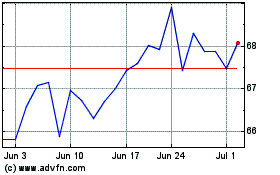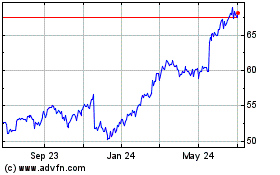Today's Top Supply Chain and Logistics News From WSJ
April 21 2017 - 7:08AM
Dow Jones News
By Brian Baskin
Sign up:With one click, get this newsletter delivered to your
inbox.
American farmers are finding themselves forced to the sidelines
of the global food supply chain. The U.S. agricultural juggernaut
is being overtaken by booming harvests in developing countries like
Brazil, which controls 43% of the export market for soybeans, up
from 12% in the late 1980s, and is close to surpassing the U.S. in
corn exports, the WSJ's Jesse Newman and Jacob Bunge write. That
gives Brazilian farmers greater sway over prices. It also means
U.S. growers increasingly make decisions about what to plant and
when to sell their harvest based on weather, transportation snarls
and other events in faraway places. In this they join U.S.
manufacturers and other industries that long ago lost their ability
to sway the global market. The shift affects more than just
farmers, as rural communities depend on tax revenue and the value
of farmland to pay for local services.
Wal-Mart Stores Inc. is putting pressure on its food suppliers
as it wages a price war in the grocery aisles. The retailer is
aggressively cutting grocery prices in a bid to fend off low-cost
brick-and-mortar rivals like Aldi and emerging online competitors,
including Amazon.com Inc., the WSJ's Heather Haddon and Sarah
Nassauer report. Consumers are coming out the winners, with
shoppers paying 1.3% less for eggs, meat and other staples last
year, the steepest drop since 1959. But it's squeezing profits at
Wal-Mart and other large grocers like Kroger Co., which must also
slash prices to hold onto customers. The chains then pass some of
the pain along to vendors. Low commodity prices have cushioned the
blow, though some analysts expect agricultural markets to turn
higher soon.
A trade dispute over steel is heating up. The Trump
administration says it's investigating whether steel imports pose a
national-security threat, potentially laying the groundwork for new
tariffs against China. President Donald Trump, who campaigned on
bringing back jobs lost as steel mills and other industrial plants
succumbed to foreign competition, said that steel is too critical a
resource for the U.S. "to become dependent on foreign countries."
U.S. presidents can limit imports on national-security grounds,
though they have rarely done so, instead relying on anti-dumping
laws that bar foreign manufacturers from exporting products to the
U.S. at below cost. Commerce Secretary Wilbur Ross called such
rules too "porous." The steel probe is still in early stages, and
similar studies in other industries this year haven't led to
concrete action. But the stakes are high, as efforts to cut steel
imports could spark retaliatory measures targeting U.S.
exports.
RAILROADS
Hunter Harrison promises changes big and small at CSX Corp. In
his first public remarks as the railroad's new chief executive, Mr.
Harrison outlined plans for sweeping changes, including idling over
500 locomotives and 25,000 railcars and untangling the "spaghetti
bowl" of intertwined East Coast routes, the WSJ's Paul Ziobro
writes. CSX is already baking reforms into its earnings outlook,
predicting profits will rise 25% this year, well beyond Wall Street
forecasts. CSX earlier reported a jump in revenue and profits on
stronger coal volumes. CSX shares were up 6% after Mr. Harrison
spoke, a sign that investors believe the 50-year industry veteran
can repeat the success he had in his previous post at Canadian
Pacific Co.
QUOTABLE
Drop in U.S. farmers' income since 2013, according to U.S.
Department of Agriculture projections.
IN OTHER NEWS
General Motors Co. stopped operations in Venezuela after
authorities expropriated its plant. (WSJ)
Japan is leading the way in collision-avoidance technologies to
assist growing numbers of elderly drivers. (WSJ)
Tesla issued a voluntary recall for 53,000 vehicles over faulty
parking brakes. (WSJ)
U.S. jobless claims rose for the first time in four weeks.
(WSJ)
The Conference Board's leading economic indicators rose for a
third month in March. (WSJ)
Construction wages in Los Angeles sank as firms hired more
immigrants and fewer unionized workers. (Los Angeles Times)
Amazon plans to expand operations in Australia, including
several new warehouses. (The Guardian)
Toyota is testing a hydrogen-powered, zero-emission truck at the
ports of Los Angeles and Long Beach. (Orange County Register)
The Port of Charleston expects bigger ships but fewer visits as
new alliances kick in. (Post and Courier)
APL has expanded its container-shipping services under new owner
CMA CGM (Tradewinds)
United and Lufthansa entered into a joint venture to cooperate
on cargo routes between the U.S. and Europe. (Air Cargo World)
The Teamsters Union, YRC Freight and two regional units agreed
to raise wages for some dockworkers. (DC Velocity)
ABOUT US
Brian Baskin is editor of WSJ Logistics Report. Follow him at
@brianjbaskin, and follow the entire WSJ Logistics Report team:
@PaulPage, @jensmithWSJ and @EEPhillips_WSJ and follow the WSJ
Logistics Report on Twitter at @WSJLogistics.
Subscribe to this email newsletter by clicking here:
http://on.wsj.com/Logisticsnewsletter .
Write to Brian Baskin at brian.baskin@wsj.com
(END) Dow Jones Newswires
April 21, 2017 06:53 ET (10:53 GMT)
Copyright (c) 2017 Dow Jones & Company, Inc.
Walmart (NYSE:WMT)
Historical Stock Chart
From Mar 2024 to Apr 2024

Walmart (NYSE:WMT)
Historical Stock Chart
From Apr 2023 to Apr 2024
